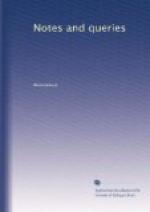“In the north parts of Scotland, and in the places adjacent, called Orchades, are certain trees found, whereon there groweth a certain kind of shell-fish, of a white colour, but somewhat tending to a russet; wherein are contained little living creatures. For in time of maturity the shells do open, and out of them by little and little grow those living creatures; which falling into the water when they drop out of their shells, do become fowls, such as we call Barnacles or Brant Geese; but the other that fall upon the land, perish and come to nothing.”
The author then quotes the passage from Gerard where mention is made of the Barnacle.
HENRY KERSLEY.
Ancient Alms-Dishes.—I have one of these dishes; diameter 1 foot 4-3/4 inches, and its height 1-1/2 inch. The centre is plain, without any device, and separated from the circle of inscription by a bold embossed pattern.
The inscription is Der infrid gehwart, in raised (not engraved) capital letters, 1 inch long, repeated three times in the circle. Mine is a handsome dish of mixed metal; yielding, when struck, a fine sound like that of a gong. It has devices of leaves, &c. engraved on the broad margin, but no date.
I have seen another such dish, in the collection of the late William Hooper, Esq., of Ross, part of which (and I think the whole of the under side) had been enamelled, as part of the enamel still adhered to it. In the centre was engraved the temptation in Eden; but it was without legend or date.
P.H.F.
Why the American Aborigines are called Indians.—I have often wondered how the aborigines of America came to be called Indians; and for a considerable time I presumed it to be a popular appellation arising from their dark colour. Lately, however, I fell in with a copy of Theatrum Orbis Terrarum. Antwerp, 1583, by Abraham Ortelius, geographer to the king; and, in the map entitled Typus Orbis Terrarum. I find America called America, sive India Nova. How it came to get {255} the name of India Nova is of course another question, and one which at present I cannot answer.
NORTHMAN.
[Footnote 3: Fleming; banishing? from fleme, A.S. to banish.]
[Footnote 4: “Helleflight,” as given in the translation, p. 178.]
* * * * *
NOTES ON BOOKS, SALES, CATALOGUES, ETC.
The arrangements for the Exhibition of Works of Ancient and Mediaeval Art at the rooms of the Society of Arts in the Adelphi, are proceeding most satisfactorily. Her MAJESTY and PRINCE ALBERT have manifested the interest they feel in its success, by placing at the disposal of the Committee for the purposes of the approaching Exhibition a selection from the magnificent collection of such objects which is preserved at Windsor.




